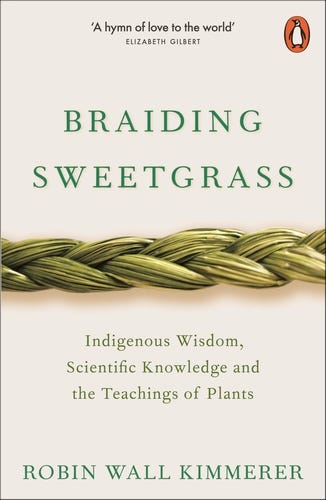Daily Notes, 21 June 2023: Sweetgrass, Spiders, Extended Cognition
It makes me think about the land, and how it has been claimed and reclaimed, with lines demarcated, erased and redrawn.
As I tweeted yesterday, I'm walking a lot more. The walks help me think and write; some of this very post was sketched out on this morning's walk:
I was listening to Robin Wall Kimmerer's Braiding Sweetgrass. Kimmerer, a First Nations scholar and a botanist, writes sentences that do what plants do — bind, wind, climb, effloresce, bud, bloom, wither, flicker — about what plants do. She opens with the Potawatomi origin story of Skywoman, who falls from the Skyworld and co-creates the Earth with the animals:
Skywoman bent and spread the mud with her hands across the shell of the turtle. Moved by the extraordinary gifts of the animals, she sang in thanksgiving and then began to dance, her feet caressing the earth. The land grew and grew as she danced her thanks, from the dab of mud on Turtle’s back until the whole earth was made. Not by Skywoman alone, but from the alchemy of all the animals’ gifts coupled with her deep gratitude.
Kimmerer compares this Indigenous origin story with that of Western Christianity; in binary opposition to the shared incandescent joy of Skywoman is Eve, whose story is one of banishment leading to a need to subugate the land to human will. It's the origin story of the Western hierarchy, with man as mightiest of all creation, and animals and plants below his feet. Skywoman gives us an alternative way of seeing, an analogue for Traditional Ecological Knowledge (TEK). It is the Skywoman to Western science's Eve; it is a cumulative body of knowedge that has been shaped by oral tradition and collectivity:
It is, Kimmerer writes, a 'grave error to separate the individual from the whole. When one tree fruits, they all fruit. Communication rings out beneath the soil, as I've previously written about in terms of mushrooms.
Science is bending this way. It's possible that spiders think with their webs. Reading A Mind Made Out of Silk, I encountered 'a review paper, published in the journal Animal Cognition, that a spider’s web is at least an adjustable part of its sensory apparatus, and at most an extension of the spider’s cognitive system.' The skull, perhaps, does not mark the separation between 'us' and 'the world out there'; rather, there is a case that cognition extends beyond us 'out there'. There's a lot more to read about here, so I end this discussion here out of fear of writing something stupid.
It makes me think about the land, and how it has been claimed and reclaimed, with lines demarcated, erased and redrawn. Africa, I learned recently, was sliced up in all sorts of horrid and nonsensical colonial ways. In 'Description of Manchester' in Alexis de Tocqueville's Journeys to England and Ireland, 1835, he writes of the land:
An undulating plain, or rather a collection of little hills...On this watery land, which nature and art have contributed to keep damp, are scattered palaces and hovels. . . .Thirty or forty factories rise on the tops of the hills I have just described. Their six stories tower up; their huge enclosures give notice from afar of the centralisation of industry. The wretched dwellings of the poor are scattered haphazard around them. Round them stretches land uncultivated but without the charm of rustic nature, and still without the amenities of a town. The soil has been taken away, scratched and torn up in a thousand places, but it is not yet covered with the habitations of men. The land is given over to industry's use. . . .Heaps of dung, rubble from buildings, putrid, stagnant pools are found here and there among the houses and over the bumby, pitted surfaces of the public places. . . .
In There Is No Such Thing As Countries, Thomas Wells notes that countries are fictional. That doesn't mean 'that countries do not matter, but it does mean that they only exist so long as enough people agree to act as if they do.' Perhaps what we're seeing now — and amidst conflicts and so-called culture wars it's hard to be optimistic — is a new cynicism towards the grand narratives that led to hierarchies, taxonomies and cartographic mythmaking, but one that's tempered with a real effusive love and connectivity, both within the natural world and fizzing through our global digital networks. Perhaps this is kama muta, the 'sudden devotion emotion' that creates deep connections within communities. It's those connections — and getting outside — that get me through the toughest days.





